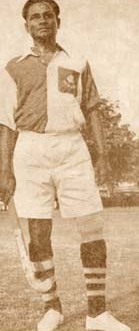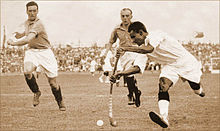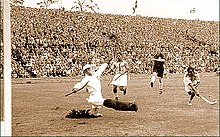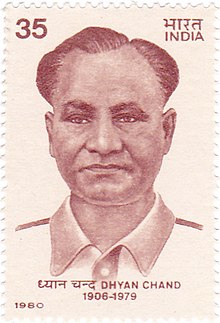Dhyan Chand
[4][5][6] He was known for his extraordinary ball control and goal-scoring feats, in addition to earning three Olympic gold medals, in 1928, 1932 and 1936, during an era where India dominated field hockey.
Dhyan Chand's influence extended beyond these victories, as India won the field hockey event in seven out of eight Olympics from 1928 to 1964.
India's highest sporting honour, Major Dhyan Chand Khel Ratna Award is named after him.
Because of his father's numerous army transfers, the family had to move to different cities, and as such Chand had to terminate his education after only six years of schooling.
He stated that he did not remember whether he played any hockey worth mentioning before he joined the Army, though he said that he occasionally indulged in casual games in Jhansi with his friends.
The IHF was initially low on funds since the provinces of Bombay, Madras, and Burma had turned a deaf ear to their financial appeal, but they managed to scrape enough money.
With a quiet send-off, the team left for England on 10 March, to play 11 matches against local sides as well in the London Folkestone Festival in 1927, winning all.
In the 1928 Amsterdam Summer Olympics, the Indian team was put in the division A table, with Austria, Belgium, Denmark and Switzerland.
On 17 May the Indian national hockey team made its Olympic debut against Austria, winning 6–0, with Chand scoring 3 goals.
The Indian team's better players Feroze Khan, Ali Shaukat and Kehar Singh Gill were on the sick list and Chand himself was ill.
However, even with a skeletal side, India managed to defeat the hosts 3–0 (with Singh scoring 2), and the Indian team won its country's first Olympic gold medal.
Posted in Waziristan in the North-West Frontier Province (now in Pakistan) with his new 2/14 Punjab Regiment, Chand, by now a naik (corporal) was cut off from the IHF, which was by now controlled by civilians.
[21] The Inter-Provincial Tournament was being held to select the new Olympic team; the IHF wrote to the Army Sports Control Board to grant Singh leaves to participate in the nationals.
Rain clouds, which had threatened to ruin the game, vanished into the blue, and thousands of spectators spent a happy hour marveling at the incomparable artistry of the Indian team."
Later, he would state:[29] If anybody asked me which was the best match that I played in, I will unhesitatingly say that it was the 1933 Beighton Cup final between Calcutta Customs and Jhansi Heroes.
Suddenly I broke through and from midfield gave a long through pass to Ismail, who ran with Jesse Owens' speed half the length of the ground.
A misunderstanding occurred between the Customs left-half and the goalkeeper, and Ismail, taking every advantage of it, cut through and netted the only goal of the match.
As such, manager Pankaj Gupta informed the IHF that Ali Dara had to be sent immediately to replace the out of form Mirza Masood.
After the interval, the Indian team launched an all-out attack, easily defeating Germany 8–1, incidentally the only goal scored against India in that Olympic tournament.
Describing the game, the Special Correspondent of The Hindu wrote:[32] Every member of the team was feeling the strain of the defeat to the Germans in the practice match, and no one was in his usual self.
I never saw a hockey team from India, where the game is definitely of a superior standard compared to the rest of the world, being so obsessed on the eve of the match.
The Germans undercut and lifted the ball, but the Indian team countered with brilliant half-volleying and amazing long shots.
Dhyan Chand discarded his spiked shoes and stockings and played with bare legs and rubber soles and became speedier in the second half.
India's goal-getters were Roop Singh, Tapsell and Jaffar with one each, Dara two and myself three.” The International Hockey Federation records also attribute only three of the eight goals to Chand in the final.
Between 1936 and the commencement of the War in 1939, he largely confined himself to army hockey, with one visit to Kolkata to take part in the Beighton Cup tournament in 1937.
[22] With the increasing need for qualified officers during wartime, he was promoted to acting subedar by July 1942 and to the war-substantive rank by early 1943.
[37] Towards the closing phases of the war, Chand led an army hockey team which toured around the battlefields in Manipur, Burma, the Far East and Ceylon.
In 1947, the IHF was requested by the Asian Sports Association (ASA) of East Africa to send a team to play a series of matches.
The team which assembled in Bombay on 23 November 1947, reached Mombasa on 15 December and played 9 matches in British East Africa winning all.
[53] An RTI was filed which suggested that the Prime Minister's Office had ignored the recommendation from sports ministry on giving the award to Sachin Tendulkar.





